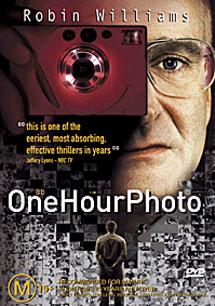
One Hour Photo
(2002, 96 min.)
Starring Robin Williams, Connie Nielsen, Michael Vartan, Dylan Smith, Gary Cole, Eriq La Salle.
Written and directed by Mark Romanek.
Williams plays Sy Parrish, a discount supermarket photo clerk who has developed, both mentally and photographically, a severe fixation on what he believes to be the perfect life of the Yorkins, a family who have been bringing their business to him for years. I was back and forth on whether I wanted to see this or not. On first hearing about it I was intrigued, especially as descriptions of it were couched in the reports of Williams attempt to flex his acting chops after his much-talked-about descent into twee-ness. I’ve always liked Williams and always felt there was a dark side to his humor, and as such would welcome a return to more mature fare for him. But after time I began to wonder what exactly the film could bring to the obsessive psycho genre, not exactly a fresh idea at this point in history. I’m happy to say that my interest won out over my skepticism, and I was rewarded in the process. Though flawed in ways, the film offers a portrait of a deeply sad and lonely individual who reinvents his reality through photographs
Writer/director Mark Romanek got his start in music video, and as such he pays a lot of attention to the visuals, all the more appropriate here being that pictures are a central theme of the story. Scenes and scenery are stylized to fit into this motif, such as the cool sterility of the supermarket where Sy works, which is used to particular effect in a startling dream sequence. But Romanek also brings depth to his story, especially in as much as it is about perception, from both scientific and psychological standpoints. He actually hits this mark a few too many times, shoehorning it in at points, but he still manages to twist the theme around, playing not only with Sy’s perception of the Yorkin family, but with the audience’s perceptions of Sy. On the one hand Sy’s life revolves around photography and yet he is also tormented by it. Sy idolizes the Yorkins for what he believes to be their charmed life, and yet in voiceover he himself points out that photo albums tend to whitewash one’s existence. And, in what I think is one of the film’s most inspired little variations, Sy, as any classic stalker does, has convinced himself that he knows the family, except in this case, in a manner of speaking, he actually does. All of this serves to give the film an enduring air of uneasiness, as does the fact that the director uses a few neat tricks to keep us guessing as to the actual depth of Sy’s psychosis.
But as nice as it is to see an unconventional approach to what is at this point in history a fairly conventional story, the ultimate drawing point here is Williams’ performance, a career redefining turn that was unfortunately overlooked award-wise. It’s hardly surprising given that many committees shy away from celebrating characters who dwell mainly in the gray areas, and there’s no denying that the sympathy Williams makes us feel for Sy stays fast even as his actions become more and more frightening.
While it’s left ambiguous at the end whether Sy has ruined or in a strange way saved the life of the Yorkins, he has in either case become an indelible part of their lives. If the film’s final shot needs any explanation, perhaps it’s that. Or perhaps it’s an indication that in this day when visual trickery is as commonplace as the stark, cold cereal laden shelves of discount markets, reality, particularly for someone as desperate as Sy, is more subjective than ever.
Go back to Plate O' Shrimp


<< Home